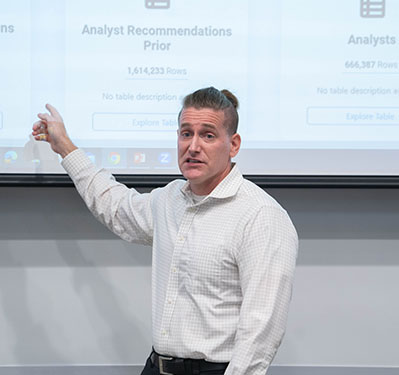Posted on November 2, 2023 by Rebekah Alegria
 Bachura’s interests range from machine learning to martial arts mastery. A jack of all trades, he is also a licensed skydiver, a licensed ham radio operator, an almost-fully licensed pilot, an amateur mixed martial artist and an avid chess player. His passion for data and mathematical analytic techniques coupled with an endless curiosity has proved to be a recipe for success in Bachura’s personal and professional life.
Bachura’s interests range from machine learning to martial arts mastery. A jack of all trades, he is also a licensed skydiver, a licensed ham radio operator, an almost-fully licensed pilot, an amateur mixed martial artist and an avid chess player. His passion for data and mathematical analytic techniques coupled with an endless curiosity has proved to be a recipe for success in Bachura’s personal and professional life.
Joining the military not long after high school, he began his career as an intel analyst while serving in the U.S. Marine Corps. Bachura also had the opportunity to work in the Department of Defense as a contractor. Through his work at the National Security Agency (NSA) at Fort Meade, he developed the skill set and persistence he exhibits today to solve difficult problems in his research.
“Working for the NSA allowed me to collaborate and rub elbows with such a diverse group of brilliant people from all branches of the military, civilians and contractors. I developed a proclivity for doing the necessary tasks that required a lot of mental effort and coding that other people didn’t enjoy, usually centered around data collection,” he explained.
After his time at the NSA, Bachura chose to further his academic pursuits by obtaining his doctorate in information technology at UTSA. Leveraging those skills garnered during his military and intelligence career, he was able to easily advance in the college’s program.
“I came in with a lot of technical skills and database knowledge, which I think gave me an accelerated start in the Ph.D. program. I was very comfortable with a wide range of development and analytic tools,” he said.
One of his most recent research collaborations began as a friendship in a doctoral statistics class. His classmate, Steven Hyde, Ph.D. ’20, now an assistant professor of management at Boise State University, recruited him to work on a project with him because of his expertise in data collection and computation. The end result was “The Tangled Webs We Weave: Examining the Effects of CEO Deception on Analyst Recommendations,” a forthcoming publication in the Strategic Management Journal, an elite academic publication, and currently available online.
Bachura used his extensive collection of conference call transcripts from publicly- traded companies to develop a machine-learning model that could assess the probability of deception in CEO statements.
In addition to the core deception model that supported the research project, Bachura also developed additional models to help further the project, and in many cases, answer reviewer questions.
“To answer some reviewer questions, we needed to also tease out the perception of deception in statements, separate from any actual deception. Fortunately, I was able to create models that could mimic human perception of essentially veracity or truthfulness in statements, which was able to help us in answering our research questions,” said Bachura.
Throughout his career, Bachura’s research projects have included building machine learning models to assess psychological or behavioral traits in an automated manner. His current research projects also involve phonetic convergence and automating psychological assessment using multimodal sets of data and semantics.
In addition to his teaching and research assignments, Bachura is also the director of the college’s new Data Analytics Center, which is dedicated to providing faculty and students with accelerated research capabilities using high-end data science resources, sophisticated analytics and the latest AI techniques to unlock the power of data.
“A lot of the initial data collection effort that went into and eventually culminated in the paper also helped support the initiative that ultimately resulted in the creation of the Data Analytics Center. This has been an ongoing project of mine since I was a doctoral student, and I cannot be more excited that students can now utilize the center,” stated Bachura.
With a personal mantra focused on enjoying all things in life, Bachura appreciates the fun side of academia that is brought forth by studying what you love.
“When I turn my head to a new research focus, I gather my topic from a place of genuine interest in answering a research question. It can be dangerous for someone with a unique set of skills to pursue their work in hopes that it garners awards and recognition. I try to avoid pursuing projects based on the hopes of a specific outcome. Instead, I hope to continue to research what I love for as long as I can because I am truly having fun,” he concluded.

